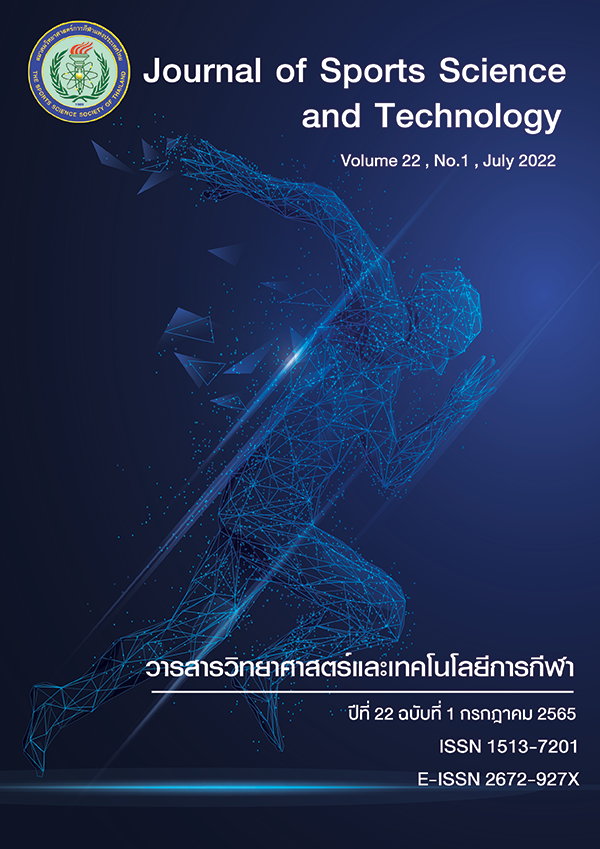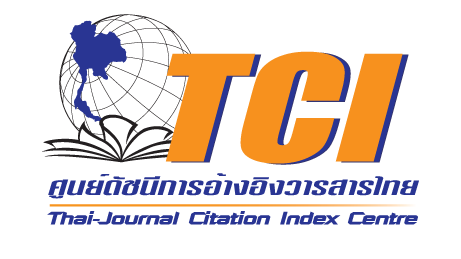THE EFFECTS OF LISTENING TO SLOW MUSIC IN COMBINATION WITH COLD-WATER IMMERSION ON RECOVERY AFTER EXERCISE TO EXHAUSTION IN MALE FUTSAL ATHLETES
DOI:
https://doi.org/10.14456/jsst.2022.9Keywords:
Cold Water Immersion, Listened to Slow Music, Male Futsal Athletes, RecoveryAbstract
This research aimed to study and compare different recovery techniques, sitting, listening to slow music, cold-water immersion, and listening to slow music in combination with cold-water immersion on recovery after exercise to exhaustion in male futsal athletes. Fourteen Kasem Bundit University male futsal players, aged 18 to 25 years, with body weight (67.88±1.17 kg.), height (175.67±1.50 cm.) participated in this study. Ambient humidity and temperature were recorded. Participant performed an incremental running test on treadmill at a speed of 10 km/hr with 0.5 km/hr increased every minute until exhaustion. Subsequently they were randomly allocated into different recovery conditions including quietly sitting alone, listening to slow music alone, cold-water immersion alone, and listening to slow music in combination with cold-water immersion for 5 minutes. A minimum of 7 days is required between each condition. Heart rate, blood pressure, ear temperature, blood lactate, and mood state were recorded at resting, immediately after exercise and after recovery All data were analyzed using one-way ANOVA with repeated measures.
Blood lactate, ear temperature and mood state (vigor or fatigue fatigue) after listening to slow music in combination with cold-water immersion, simply cold cold-water immersion, simply listening to slow music, and
simply idle sitting for 5 minutes were statistically different at p<0 0.01 level of significance Blood lactate, ear
temperature and mood state ( fatigue were significantly lower, whereas mood state (vigor) was higher in the
listening to slow music in combination with cold-water immersion group than those in simply cold cold-water
immersion, simply listening to slow music, and simply idle sitting for 5 minutes , whereas heart rate and mean
blood pressure after recovery were not significance significance. It was found that recovery technique by listening to slow music in combination with five-minute shin-level 10-15°C cold-water immersion was an alternative effective technique to recover, relax and refresh the body and mind after exercise to exhaustion. Therefore, it is suggested for athletes to apply this research in real futsal competition during half time break with simultaneous tactical game meeting. It could also be applicable to other sports.
(Journal of Sports Science and Technology 2022; 22(1):113-126))
(Received: 13 August 2021, Revised: 12 April 2022, Accepted: 18 April 2022) KEY WORDS: Cold Water Immersion/ Listened to Slow Music/ Male Futsal Athletes/ Recovery
Corresponding Author: Chadaphan SUWANNATE Faculty of Sports Science, Kasem Bundit University, Bangkok, THAILAND
E-mail: chadaphan.suw@kbu.ac.th
References
Burns T. Holistic futsal a total mind-body-spirit approach. illustrated ed: Lulu.com, 2003; 2003.131 p.
Makaje N, Ruangthai R, Arkarapanthu A, Yoopat P. Physiological demands and activity profiles during futsal match play according to competitive level. J Sports Med Phys Fitness. 2012;52(4):366-74.
Castagna C, D'Ottavio S, Vera JG, Alvarez JCB. Match demands of professional Futsal: a case study. J Sci Med Sport. 2009;12(4):490-4.
Barbero-Alvarez JC, Soto VM, Barbero-Alvarez V, Granda-Vera J. Match analysis and heart rate of futsal players during competition. J Sports Sci. 2008;26 (1):63-73.
Kang O-D, Park Y-S. Effect of age on heart rate, blood lactate concentration, packed cell volume and hemoglobin to exercise in Jeju crossbreed horses. J. Anim. Sci. Technol. 2017;59(1):1-6.
Vaile J, O'Hagan C, Stefanovic B, Walker M, Gill N, Askew CD. Effect of cold water immersion on repeated cycling performance and limb blood flow. Br. J. Sports Med. 2011;45(10):825-9.
Bieuzen F, Bleakley CM, Costello JT. Contrast water therapy and exercise induced muscle damage: a systematic review and meta-analysis. PloS one. 2013;8(4):e62356.
Hohenauer E, Taeymans J, Baeyens J-P, Clarys P, Clijsen R. The effect of post-exercise cryotherapy on recovery characteristics: a systematic review and meta-analysis. PloS one. 2015;10(9):e0139028.
Jedsada T. The effect of cool treatment on recovery of Thai amateur boxers. Bangkok: Srinakharinwirot University; May 2011.
Arom T, Pranomporn P. Study of a 5-minutes cold-water immersion at knee level during half time official match on recovery performance of football players in the hot weather. J Sports Sci Technol July 2018;18(1):37-48.
Karageorghis C. Music in Sport and Exercise: Theory and Practice The Sport Journal; February 2018 [Available from: https://thesportjournal.org/article/music-in-sport-and-exercise-theory-and-practice/.
Terry PC, Karageorghis CI. Chariots of fire: The role of music in sport and exercise. Sport and exercise psychology: The cutting edge Morgantown, WV: Fitness Information Technology. 2011.
Hsu DY, Huang L, Nordgren LF, Rucker DD, Galinsky AD. The music of power: perceptual and behavioral consequences of powerful music. Social Psychological and Personality Science. 2015;6(1):75-83.
Chadaphan S, Nutthaporn A, Prathomporn S, editors. Effects of slow music on exercise performance in futsal athletes. 9th Institute of Physical Education International Conference "Creative Innovations in Sports for Sustainable Development"; 2019 May 19-21; The Emerald Hotel, Bangkok, Thailand.
Dyck EV, Moens B, Buhmann J, Demey M, Coorevits E, Bella SD, et al. Spontaneous Entrainment of Running Cadence to Music Tempo. Sports Medicine - Open. 2015;1(15):1-14.
Chadaphan S. Effect of fast music on exercise performance. J Sports Sci. Health. May-August 2017;18(2):69-78.
Choosakul C. The Brunel Mood scale Translated to Thai by the permission of Peter C Terry & Andrew M Lane . User guide for the Brunel Mood Scale (BRUMS). University of Queensland, Australia & University of Wolverhampton, UK2008.
Mokayef M, Moghadasi M, Nuri R. Effect of cold water immersion on blood lactate levels of table tennis players. Int J Curr Res Aca Rev. 2014;2(9):115-23.
Wilcock IM, Cronin JB, Hing WA. Physiological response to water immersion. Sports medicine. 2006;36(9):747-65.
Yanagisawa O, Niitsu M, Takahashi H, Goto K, Itai Y. Evaluations of cooling exercised muscle with MR imaging and 31P MR spectroscopy. Med Sci Sports Exerc. 2003;35(9):1517-23.
González-Alonso J, Teller C, Andersen SL, Jensen FB. Influence of body temperature on development of fatigue during prolonged exercise in the heat. J Appl Physiol. 1999;86(3):1032-9.
Peiffer JJ, Abbiss CR, Watson G, Nosaka K. Effect of a 5-min cold-water immersion recovery on exercise performance in the heat. Br J Sports Med. 2010;44(6):461-5. 23. Agrawal A, Makhijani N, Valentini P. The effect of music on heart rate. J Emerg Investig. Apr 25, 2013:1-5.
Karageorghis C. Applying music in exercise and sport. London, UK: Human Kinetics; 2017.
Bertini MA, Williams B. The effects of guided imagery & music on anxiety. subtle energies & energy medicine. 2001;16(2):13-6.
Bhavsar SD, Abhange RS, Afroz S. Effect of different musical tempo on post-exercise recovery in young adults. J. Med. Dent. Sci. 2014;13(5):60-4.
Desai RM, Thaker RB, Patel JR, Parmar J. Effect of music on post-exercise recovery rate in young healthy individuals. Int J Res Med Sci. 2015;3(4):896-8.
Thakur AM, Yardi S. Effect of different types of music on exercise performance in normal individuals. Indian J Physiol Pharmacol. 2013;57(4):448-51.







